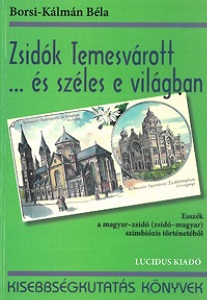

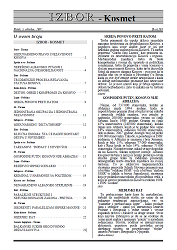
Keywords: Kosovo; Metohija; Serbia; international law; independence; Albanians; ethnicity; Dayton; Ohrid; war; Balkans; citizenship;
MEĐUNARODNO PRAVO I NEZAVISNOST KOSOVA (Start - Tirana) NEREŠENO ALBANSKO PITANJE I NACIONALNA (NE)MOBILISANOST (Epoka e re - Priština) TRI DIMENZIJE PROCESA REŠAVANJA STATUSA KOSOVA (Zëri - Priština) DEJTON, OHRID I KOMPROMIS ZA KOSOVO (Koha ditore - Priština) SRBIJA PONOVO PRETI RATOM (Lajm - Priština) JEDNOSTRANA OKUPACIJA I JEDNOSTRANA NEZAVISNOST (55 - Tirana) MEĐUNARODNI “DICTATORSHIP” (Infopress - Priština) KLJUČNA ENIGMA: ŠTA ĆE RADITI KONTAKT GRUPA U NOVEMBRU (Zëri - Priština) TARZANOVI “ROĐACI” I STIVEN ŠUK (Epoka e re - Priština) GOSPODINE PUTIN, KOSOVO NIJE ABHAZIJA! (55 - Tirana) REZERVNI SRPSKI SCENARIO (Lajm - Priština) KRIMINAL U HARMONIJI SA POLITIKOM (Infopress - Priština) NENAGRAĐENO ALBANSKO STRPLJENJE (Kosova sot - Priština) PARALELNE STRUKTURE I NEFUNKCIONISANJE ZAKONA - PRETNJA (Zëri - Priština) ISKORENITI PARALELIZAM SRPSKE MANJINE (55 - Tirana) MEDIJSKI RAT (Koha ditore - Priština) BALKANSKI SUKOB OKO DVOJNOG DRŽAVLJANSTVA (Gazeta shqiptare - Tirana)
More...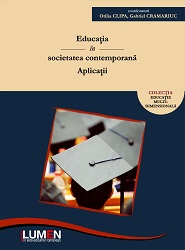
Keywords: Higher pedagogical education; structural reform of national education system; European educational space; Bologna process; changes in teacher education
The article deals with the changes in teacher's education designed to ensure high competitiveness of future graduates. The author enlists all the reforms needed in educational field for Ukrainian education to become able to compete with those of European countries. It is stated that process of structural reform in national education systems, changes in educational programs and institutional reforms should be made. The legislative norms for the changes in question are reviewed. The author comes to the conclusion that given evolution of the education system should not be separated from other areas of society. It has to develop in a harmonious interrelation with society as a whole, taking on the role of its leader.
More...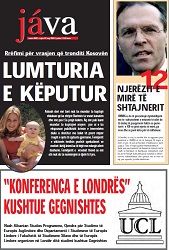
Keywords: Kosovo 2003;
More...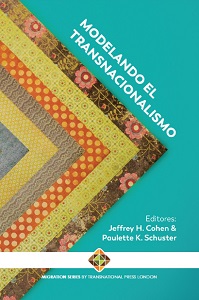
Keywords: refugees; second language; Italy
The need to provide second language courses for those who migrate to European countries requires a specialization process in the language teaching sector in migratory contexts. In spite of this, the states of the European Union organize language courses and exams which still do not seem appropriate for this type of users. Also for what concerns the specific case of refugees, migrants who often. They are passing through a state, there are few initiatives that attend really to your linguistic needs.
More...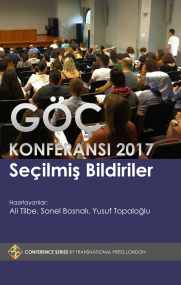
Keywords: migration; literature; Turkish; Greek; comparative study; novels;
Tarihe ilişkin araştırmalar çoğunlukla olayların sebebi, gerçekleşme biçimi ve sonucu üzerinden birtakım rakamlara, kazanımlara, kayıplara yer vererek okurun zihninde genel bir şablon çizmeyi hedefler. Genelleştirme ne kadar büyük ve tutarlı ise varılan sonucun da o denli önemli ve isabetli olduğu düşünülür. Bu yaklaşım tarihe meraklı insanların geçmişte yaşananlar hakkında bilgi edinmesini ve bu bilgilerin kalıcı hâle gelmesini kolaylaştırıcı bir yoldur. Esasen bu genelleştirme, sadece Tarih’te değil bütün bilimlerde kullanılabilen bir metottur. Fakat şurası bir gerçek ki bahsi geçen genelleştirme eylemi, biricik olan ‘insan’a ait duyguların yer yer görmezden gelinmesine ya da büsbütün geçiştirilmesine neden olabilir. Sözgelimi “I. Dünya Savaşı Avusturya-Macaristan veliahtı Arşidük Franz Ferdinand’ın 28 Haziran 1914’te Gavrilo Princip adında bir Sırp milliyetçisi tarafından Saraybosna’da öldürülmesi ile patlak verdi.” şeklinde başlayan I. Dünya Savaşı betimlemeleri buna benzer birçok cümle ile olaylar arasında farklı nedensellik ilişkileri kurularak uzun uzadıya anlatılır.
More...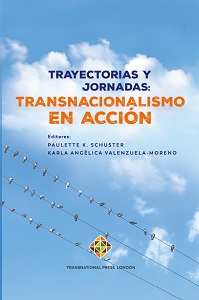
Keywords: Identity; refugees; Italy; social status; migration;
Existing theories about the concept of identity associate the redefinition of the identity of migrants with the awareness of the social status they possess in their new environment. The formation of social status contributes to anti-immigration feelings that widen the gap between locals and refugees. In light of these premises, this study aims to deepen the issue of identity development in the migratory field, focusing on the case of refugees. In order to do so, ethnographic work has been carried out in the Italian context, conducting twenty-eight interviews with adult refugees in the Salento area in southern Italy. The results of this research refer to the social status of refugees in Italy, as well as the provisional nature of their identities. The temporality of identities lies both in the condition of the refugee itself and in the effects of anti-immigration policies.
More...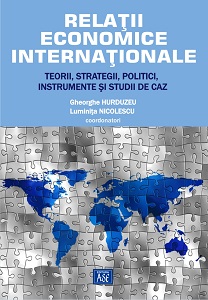
Objectives: - To understand the role of international organizations in the context of global governance - To synthesize the relationship between international organizations – globalization – global governance - To acquire basic knowledge in the field where international organizations operate - To analyse international organizations as global players
More...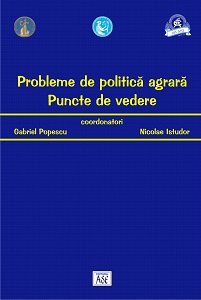
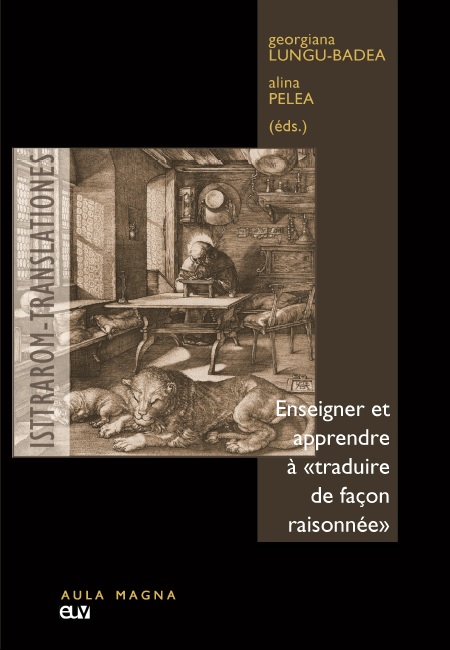
Keywords: teaching translation;reasoned translation;professional translation;literary translation;didactic translation;translation method; translation memories
More...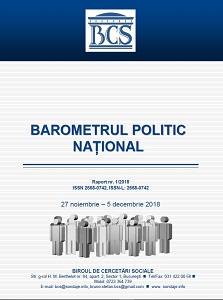
Keywords: European elections;trust in political leaders;voting intentions;
Survey conducted between November 27 and December 5, 2018 on a sample of 1087 people. He measured issues such as: union with the Republic of Moldova, special pensions, electronic voting, expectations from the European Union and MEPs, the perception of Prime Minister Viorica Dăncilă, confidence in political leaders, voting intentions, evaluation of the last four presidents of Romania.
More...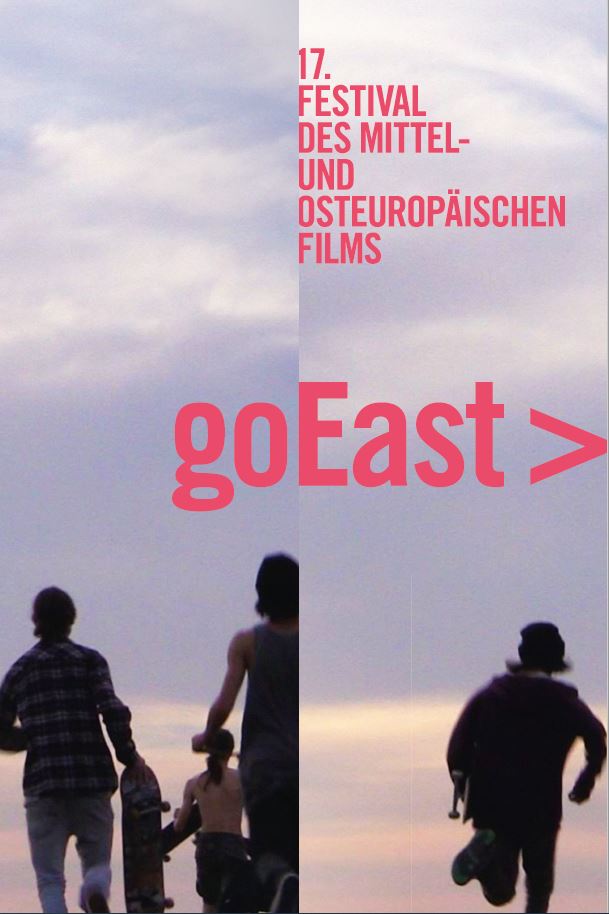
Keywords: film;festival;catalogue;
More...
Keywords: festival;catalogue;film;
More...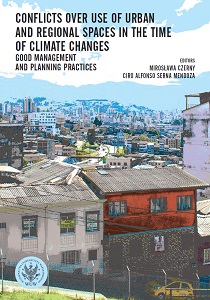
Keywords: energy efficiency; climate change; poverty; sustainable development
The aim of this document is to identify the way in which energy effi ciency contributes to sustainable development, especially in countries with high poverty rates. To this end, a qualitative investigation was performed, which made use of content analysis. Therein, based on a bibliographic review of energy efficiency in the international setting, it was possible to identify several elements which permit determination of the way in which energy efficiency is a viable sustainable development alternative. This is so because it permits the mitigation of the effects of climate change and reduces poverty, thus providing a possible solution to the environmental, social, and economic crisis faced today by communities and territories worldwide.
More...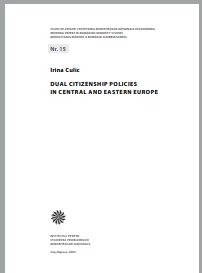
Keywords: Dual citizenship policies; Transnationalism; Extra-territorial nationalism; Minority protection; Eastern-Western Europe;
The paper provides a historical-sociological investigation of post-communist dual citizenship policies in Central and Eastern Europe, proposing to conceive of citizenship as a means of state building. While dual citizenship policies in Western Europe generally took an inclusionary form, generated by the stringent need to incorporate and assimilate foreign immigrants, and to come to terms with their colonial and world expanding capitalist past, in Central and Eastern Europe they have essentially been differentialist, putting emphasis on ethno-cultural distinctions and privileged historical relationship with a state. In an attempt to synthesize the dominant motives governing the strategies chosen by these states, in the second part of the paper dual citizenship practices are inventoried according to a typology that reveals different state rationalities. Finally, an examination of asymmetries in dual citizenship aims both to further the state building argument, and to point to the tensions inherent in dual citizenship legislation.
More...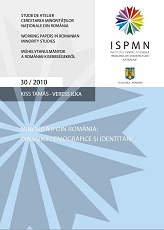
Keywords: Romania; Minorities; Ethno-demographic research; Ethnic identities;
The study proposes to draw out the etno-demographic portray of national minorities from Romania. The analysis has as a start point the statistic dates given by the National Institute of Statistics with wich ISPMN concluded a unitive protocol. The dates used for the elaboration of this study can be grouped in two categories: 1. Census dates and 2. dates which come from the population dynamics. As concerning the analysed minorities, it started from the structure of parliamentary representation of the minorities from Romania.
More...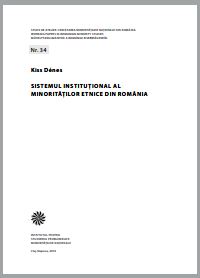
Keywords: Minority Institutional system; Romanian minorities; Minority institutional sphere;
Having the objective to draw a minority institutional model, the present study analyzes the ethnic minority organizations from Romania in a comparative perspective. At the same the study intends to increase knowledge about, and to facilitate access to these minority institutions. The study contains three chapters: the first lays down the theoretical basis for drawing the institutional model; the second chapter presents the features of the minority institutional sphere; while the last chapter details the institutional system of each minority included in the analysis.
More...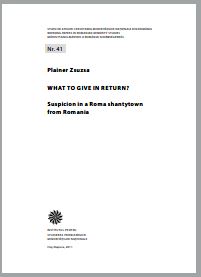
Keywords: Anthropology; Inter-ethnic relations; ethnicity and economics; Stigmatized ethnicity; gender inequality;
By summing up the literature of social anthropology the article provides a broader perspective on the proposed theme. It is especially important that by translating this study Romanian readers have the chance to get acquainted with a small segment of the scientific activity of the researcher. The study of stigmatized ethnicity, gender inequality and precarious work signed by Enikő Vincze, professor of anthropology and gender studies at Babeş-Bolyai University, is a text based on research into social exclusion, multiple discrimination in an East European context, with a look focused on Roma women. Activist research along with the involvement of the researcher in the work of several civic organizations provides a new insight into the current scientific field.
More...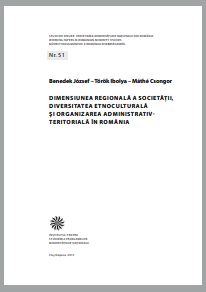
Keywords: Obligatory work; Jews in Romania and Hungary; World War II; Labor service;
This paper proposes to compare the ideological and legal frameworks of the Romanian and Hungarian Jewish labor service system. The analysis brings into focus Transylvania, a territory which was divided between Hungary and Romania in the time of the Second World War. Between 1940-1944 the northern part of Transylvania was part of Hungary, while the southern territories belonged to Romania. This territory split in two had a Jewish population with common characteristics like their Hungarian language and culture and their socio-cultural background. However, their fate in the time of the Holocaust were totally different.
More...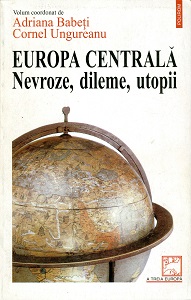
Keywords: Central Europe; 19th century; 20th century; identity;
O clată cu prăbușirea zidului Berlinului, ecoul căderii pieselor de domino se face auzit în întreaga Europă Centrală și de Est. Dezintegrarea „sistemului Yalta” (retragerea Rusiei sovietice) ridică probleme - mai vechi sau mai noi - în legătură cu rolul factorului german în ecuația central-europeană. Valul democratic - care, începînd cu septembrie 1989, a zdruncinat din temelii Republica Democrată Germană - a făcut și mai clară legătura directă dintre schimbările politice din Europa Centrală și așa-numita „problemă germană”. Din rațiuni strict istorice, este imposibil să revendicăm o identitate central-europeană fără a lua în considerare componenta ei germană, esențială ; iar ca națiune cu două state, Germania rămîne simbolul prin excelență al unui continent fărîmițat.
More...